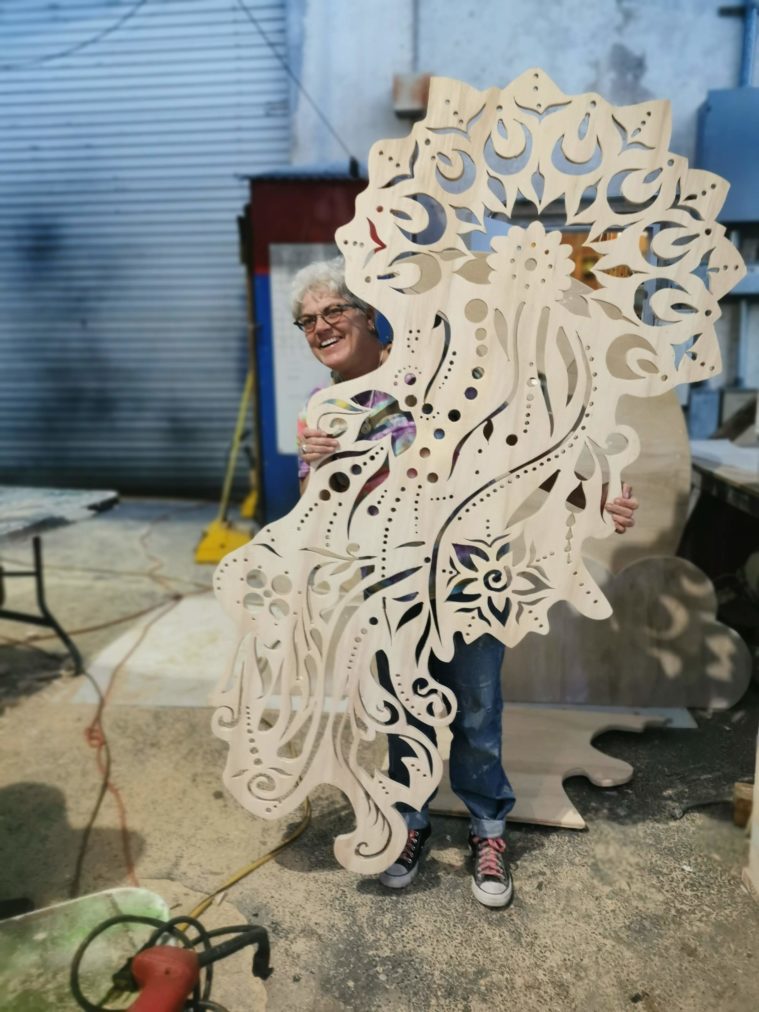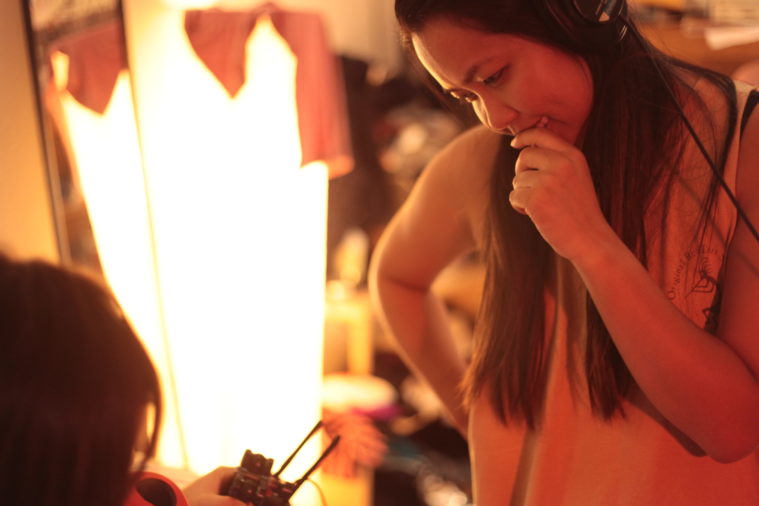Thousands of Austinites depend on South by Southwest for income, and many are still reeling after the event was officially canceled last week due to coronavirus fears. SXSW laid off a third of its full-time staff, with an anonymous employee telling the Austin Chronicle (which itself relies heavily on the festival) that the move was “the only way to stop the bleeding.”
In addition to the musicians, filmmakers, and other creative workers directly involved with SXSW, a massive gig economy springs up around the conference each year: Uber drivers and pedicabbers, carpenters and stagehands, bartenders and caterers. Those jobs have now evaporated: More than 400 people reported $2 million in lost wages to I Lost My Gig, a website where struggling workers are asking for donations and looking for new income sources. A slew of other crowdfunding campaigns have popped up, as have calls to support local businesses and restaurants. Still, many are left with few (if any) options for replacing the money they lost. The Observer spoke with seven workers about how they’ve been affected.
Matthew Maschek, pedicabber
SXSW is the biggest event of the year for Matthew Maschek, founder and owner of the Austin Pedicab Company. “It’s probably about a third of our gross revenue,” he says. “As soon as [the cancellation] happened, I was like, ‘The sky is falling.’
Maschek usually works with about 50 drivers for the festival; about a quarter of them have backed out. Corporate clients have pulled out, too. “Advertising, brand campaigns, and corporate events are all big for us,” he says.
Still, Maschek is hopeful that business will rebound. In September, Austin City Council approved electric-assist pedicabs and widened the operation boundaries of the vehicles, allowing drivers to offer more frequent and longer rides. “With that change, we’ve had one of the busiest winters that I’ve seen,” Maschek says. He’s also counting on unofficial SXSW traffic and hoping that the festival might be rescheduled for later in the year. “It’s definitely going to be interesting.” —Rose Cahalan
Faith Schexnayder, fabricator and artist
You may not know Faith Schexnayder’s name, but you’ve probably seen her work. Flat Fork Studio, her custom art and fabrication company, makes large-scale sculptures and installations for companies in Texas and around the nation. The gingerbread houses and giant peppermints at Austin’s Trail of Lights are her creation; so are the enormous golf balls that people pose for photos with at the PGA Golf Tournament. (“Somehow I’ve gotten known as the golf ball queen,” she says. “Anyone who wants a giant golf ball will give us a call.”) Instagram has been good for her business as the demand for eye-catching photo backdrops has risen.

Schexnayder and her five employees had been working long hours in preparation for SXSW. “If I have to stay all night to finish a project, or work on the weekends, or take calls at midnight, that’s just what we do,” she says. Now, three corporate clients have canceled, and she’s out $40,000. Large sculptures and photo walls languish in her warehouse, taking up vital space that she needs to make room for new work. The business is tumultuous even in a good year. “A lot of these companies will come in with last-minute decisions, and then they expect us to basically perform miracles within weeks of the event,” she says. “We come and we do our magic, and then we’re gone. People wonder how these cool things magically appear—well, it’s us.”
The cancellation of SXSW affects not just Schexnayder and her artists, but an entire ecosystem of workers who make mega-sculptures possible: welders, carpenters, printers, and specialty shipping companies. A photo backdrop now gathering dust in her studio took more than 120 hours to create, and the client is still deciding if or how to use it. Building a custom shipping crate alone will be painstaking. Overall, Schexnayder is worried about the financial hit—she’s having to lay off artists—but she’s also confident that something will work out. “If you’re going to do this for a living, you have to be adaptable and flexible,” she says. —Rose Cahalan
Ali Tahir, event bartender and caterer
Ali Tahir estimates that in a typical year, about half of his income comes from SXSW. Most of his catering and event bartending gigs have been canceled, and he’s trying not to panic. He estimates that he’s missing out on about $4,000 in lost wages. “There’s always a post-holiday slump from January toward the end of February, and I was counting on SXSW as a big bump to get me through the rest of the year,” he says. “I’m concerned that I will not have what I need to make rent this month, and that is very stressful.”
Tahir has been looking for work on a Facebook page called In the Weeds—service-industry slang for “overwhelmed”—and is hoping that a tax return will help tide him over. But he’s frank about how unreliable event bartending is. He can’t count on regular shifts at a bar, so when SXSW and many unofficial events were canceled, so was his paycheck. Tahir is enrolled in a Python bootcamp and hopes to transition to a career in software development. For now, though, he’s struggling: “I’m part of an industry that’s at the whim of things like political decisions, viruses, and weather.” —Rose Cahalan
Kim Tran, filmmaker
When Kim Tran learned that her short film Zoe and Hanh would premiere at SXSW, she was elated. An Austin native, Tran grew up going to the festival and volunteered there during her undergraduate years at the University of Texas (she’s now completing her MFA in screenwriting at UT’s Michener Center for Writers). She was “so, so excited” that her nine-minute film, which is about the relationship between a Vietnamese mother and her teenage daughter, was selected as part of the Texas Shorts Competition. Being selected for SXSW felt like a badge of approval—a big deal for an emerging filmmaker like Tran, who at times struggled to feel like she belonged in UT’s “very white, bro-y” radio-television-film program. After Zoe and Hanh was announced as a selection, she started hearing from organizers of other festivals. “Being selected for SXSW says, ‘This person is talented, you should check them out,’” she says.

She was disappointed to learn that SXSW was canceled. “In terms of connections and networking, I’m sure I’m missing out on a lot,” she says, “but I understand why they did it.” Tran has been emailing with other filmmakers from the Texas Shorts program, brainstorming alternative ways to promote their work. “There’s been a sense of community, which is really nice,” she says, “and a few other film festivals are putting together waivers for SXSW filmmakers to submit for free.” Getting creative, Tran also submitted Zoe and Hanh to Short of the Week, a website that streams a selection of top short films for free. She made the cut, and will have her online premiere on March 18. —Rose Cahalan
Sara Landry, DJ
Two days before the City of Austin made its SXSW announcement, Sara Landry sensed trouble. On March 4, Miami’s Ultra Music Festival—set for later that month—was canceled, citing fears of coronavirus. Shit, she thought.
That’s when she kicked things into high gear. Landry, a DJ, had been mulling starting a scoring, audio editing, and voiceover side-hustle since January. But after the one-two punch of Ultra and SXSW cancellations, she hunkered down with Torchy’s and no small amount of panic to spend the weekend getting a new website off the ground.

“A lot of people’s livelihoods, mine included, are dependent on being able to go out into a public space and hold events where lots of people are together in close proximity,” she says. “That, in general, is affected by this disease and what’s happening.”
This year, Landry was set to perform her first official SXSW showcase after spinning in Austin’s underground house and techno scene since 2016. She hoped to use SXSW as a chance for exposure and networking, a jumpstart to her set at Coachella—the big leagues of music festivals—in April. Although she was sad about the cancellation, she understood the decision.
“I admire the city greatly for taking proactive actions,” she says, “because I do think what’s happening with this disease in general is more concerning than maybe people realize.”
But it also made her think of the larger socioeconomic impacts of coronavirus for people like her: the artists, venue staff, photographers, and service industry folks for whom social distancing means losing income.
“If I get sick, or if my gigs dry up because of factors that are far beyond my control, what do I do to pay my bills? What happens? These are questions that a lot of people I know are asking. What happens if the normal order is shaken so much that my source of income disappears overnight?”
Landry was able to “largely” replace the income that she lost from SXSW through what industry folks dub Austin Music Week—the stretch of 10 or so days surrounding the conference when unofficial parties dominate downtown bars and venues. An informal coalition has formed to make sure those shows will go on.
Still, she is wary of what comes next.
“All of that planning is happening under what I perceive to be the dark cloud of further event restriction,” she says. “I can’t predict what’s going to happen. I have no idea. I just really hope that everybody is able to pay their bills and stay as healthy as we can.”
Two days after we spoke, over concerns about coronavirus, Coachella was moved to October. —Abby Johnston
Kydd Jones, producer
For Kydd Jones, SXSW’s cancellation lost him nine events and at least $1,500 from merchandise alone. A hip-hop artist and producer, Jones has performed at SXSW in the past, but he’s worried about his less established friends who lost their showcases and the opportunity for growth and exposure. Jones says a few of the shows he helped plan will still happen unofficially, and some of the big production companies that he works with are offering to pay artists for shows that SXSW would have funded. Meanwhile, smaller local venues can’t foot that bill. “Some of these venues, if they don’t do great all year, during SXSW they know they’re going to do really well,” he says. Now, a central part of their budget may have completely dried up.
Most musicians he knows, Jones says, rely on merchandise sales to boost their incomes during SXSW. He thinks enough people will still show up next week that he’ll break even on merch, but likely won’t make any more than that. Still, he’s hopeful about the future. Jones and the venues he works with are already thinking about events for next year, when he speculates that he’ll probably be involved in up to 20 shows, compared to nine planned this year. For the time being, he says, he’s focusing on moving forward: “It’s a good thing to still go out and still support and just try to keep the spirit alive as much as possible while being safe and clean.” —Nick Yeager
David Boss, master carpenter
Some of the longest lines at SXSW aren’t for concerts, panels, or films. Queues serpentine around the block for immersive experiences—the elaborate sound, light, and tactile events that big brands construct around downtown Austin each year.
David Boss is an integral part of these Instagram-worthy experiences. Two years ago, he helped transform a warehouse on Cesar Chavez Street for Sony. In 2019, he worked on The New Japan Islands—25 activations put on by Japan’s Ministry of Economy, Trade and Industry department that offered a glimpse into the future of the country. That exhibit, done in collaboration with media artist Yoichi Ochiai, won Best Immersive Experience.

But while brands are likely mourning the loss of two weeks’ worth of social media buzz in the wake of SXSW’s cancellation, Boss is struggling to make up for lost income. A master carpenter, he’s dedicated 70 to 100 hours to bring these experiences to life for each of the past three years. This year, the independent contractor estimates that he would have made 15 percent of his annual income during the conference.
The Austin community has rallied around musicians and service industry workers to help offset financial costs, but there’s no equivalent for Boss’ sector of the industry. “There’s been this talk—rightfully so—about making an effort to support waitstaff, bar staff,” he says. “The tough part about what I do, and what a lot of people in the town do—AV techs, carpenters, stagehands—it’s not like you can go back to your regular job. SXSW was the job, and that job is now gone.”
Boss has turned to his professional and personal networks to look for work: If you need a porch or deck built or home renovations, he’s your guy. “I’m literally going to bars I would never step foot in and handing out my card, saying, ‘Hey, if you need any help with patio benches, let me know,’” he says.
He’s frustrated, however, that any work that he or his colleagues have found has been homegrown. “I’m very disappointed in how the city has handled this in terms of providing any sort of safety net or help,” he says. “I understand that would be a hard endeavor to take part in … but I think that the city should at least try. And so far I haven’t seen any effort.” —Abby Johnston
Read more from the Observer:
-
John Cornyn Bets Big on Trump: During the impeachment proceedings, Cornyn proved that his calculation is the same as the entire GOP’s: Live with Trump, die with Trump.
-
Medicare Covered Her Medication for a Decade. Now, She Could be Spending Thousands Each Month For Migraine Relief: A federal judge in Austin recently denied a patient’s appeal asking Medicare to cover the skyrocketing cost of her prescription.
-
Gabriel García Márquez and the (Comforting) Case for Embracing Failure: A new Austin exhibit reveals how much the acclaimed Colombian writer struggled to make a living and find success.







